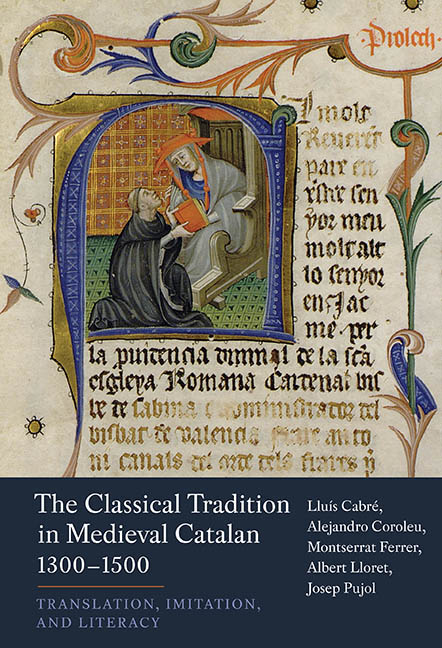Book contents
- Frontmatter
- Contents
- List of Maps
- Preface
- List of Abbreviations
- Part I The Classical Tradition in Medieval Catalan
- Part II Catalogue of Translations to 1500
- Appendix 1 Italian Renaissance: Printed Editions, 1473–1535
- Appendix 2 Rulers of the Crown of Aragon, 1137–1516
- Bibliography
- Index of Manuscripts
- Index
Preface
Published online by Cambridge University Press: 03 July 2019
- Frontmatter
- Contents
- List of Maps
- Preface
- List of Abbreviations
- Part I The Classical Tradition in Medieval Catalan
- Part II Catalogue of Translations to 1500
- Appendix 1 Italian Renaissance: Printed Editions, 1473–1535
- Appendix 2 Rulers of the Crown of Aragon, 1137–1516
- Bibliography
- Index of Manuscripts
- Index
Summary
In 1889 Antoni Rubió i Lluch published The Classical Renaissance in Catalan Literature (El renacimiento clásico en la literatura catalana), the speech he gave to mark his admission to the Royal Academy of Belles Lettres of Barcelona. This institution, born in 1700 as an Enlightenment salon, was, by the end of the nineteenth century, bringing together scholars intent on restoring knowledge of early Catalan literature as part of a broader plan, dubbed the Renaixença (Renaissance), to revive Catalan as a literary language. Modern Romance philology had come to be studied at the University of Barcelona – and indeed in the Iberian Peninsula – thanks to Manuel Milà i Fontanals. Rubió i Lluch had been one of his star pupils, a classmate of Marcelino Menéndez y Pelayo, the head of the school of Spanish Philology. In his early thirties and with his Hellenistic education, Rubió i Lluch wanted to use his speech at what was at the time the most distinguished Catalan academic institution to point out that the history of Catalan medieval literature not only owed a debt to the wealth of Romance-language literature, to troubadour poetry, and to chivalric romance, but also that it had roots in the classical tradition and its subsequent revival in Renaissance Italy.
This volume is ultimately the progeny of Rubió i Lluch's speech. First and foremost, it provides an overarching vision of the presence of the classical tradition in medieval Catalan literature, drawing on the output of more than a century of academic research. In 1904 Rubió i Lluch began a course of university studies in Catalan (Estudis Universitaris Catalans) to run in parallel with the official ones in Spanish. He was the first in an unbroken chain of academics continuing until the end of the Spanish Civil War in 1939, from Lluís Nicolau d'Olwer to Martí de Riquer, and including his son Jordi Rubió i Balaguer among many others, who had the privilege to discover – quite literally – some of the treasures of medieval Catalan literature. Their research benefitted from studies on Italian influences by Mario Casella, Arturo Farinelli, and Bernardo Sanvisenti.
- Type
- Chapter
- Information
- The Classical Tradition in Medieval Catalan, 1300–1500Translation, Imitation, And Literacy, pp. ix - xiiPublisher: Boydell & BrewerPrint publication year: 2018



